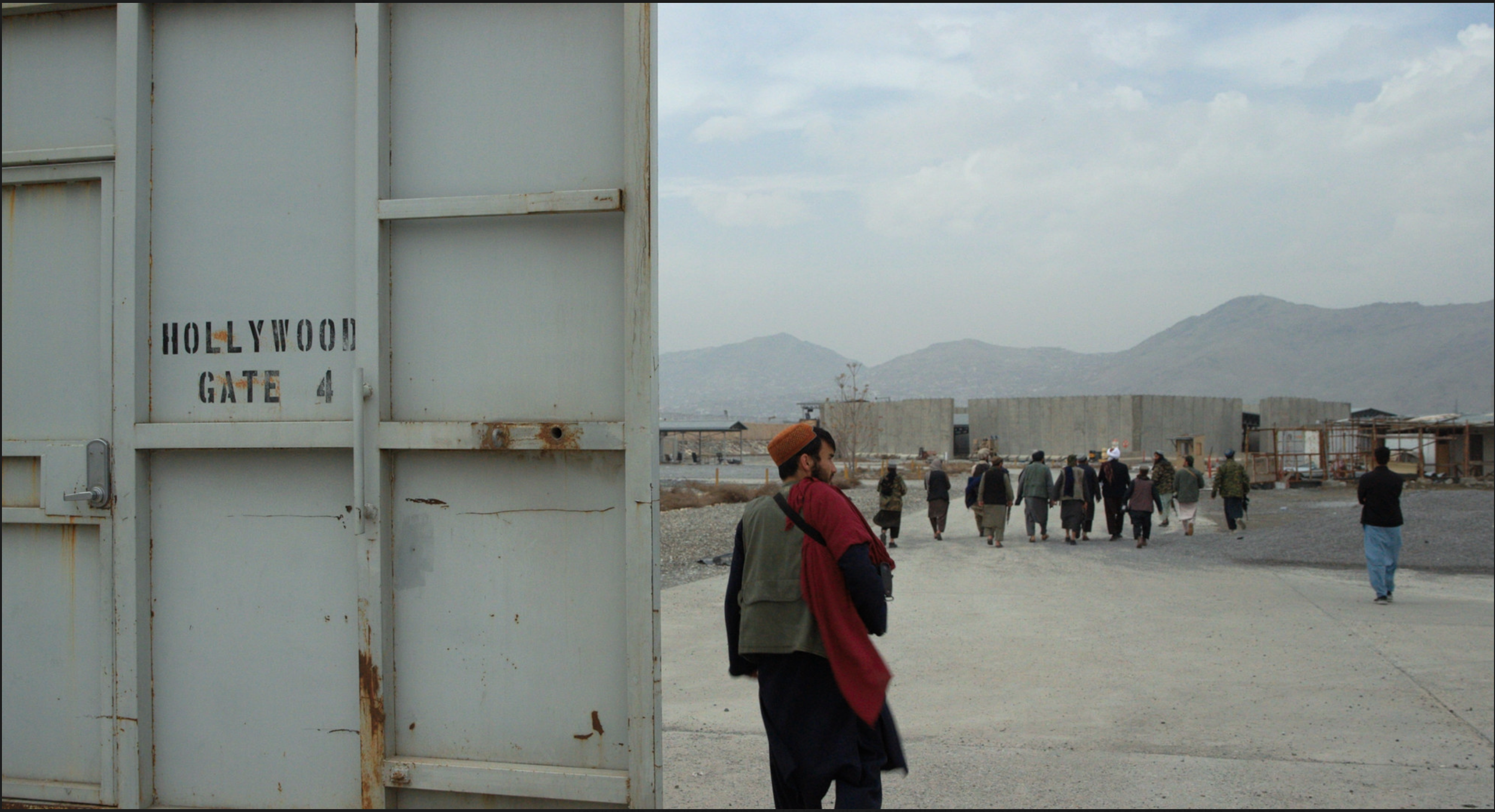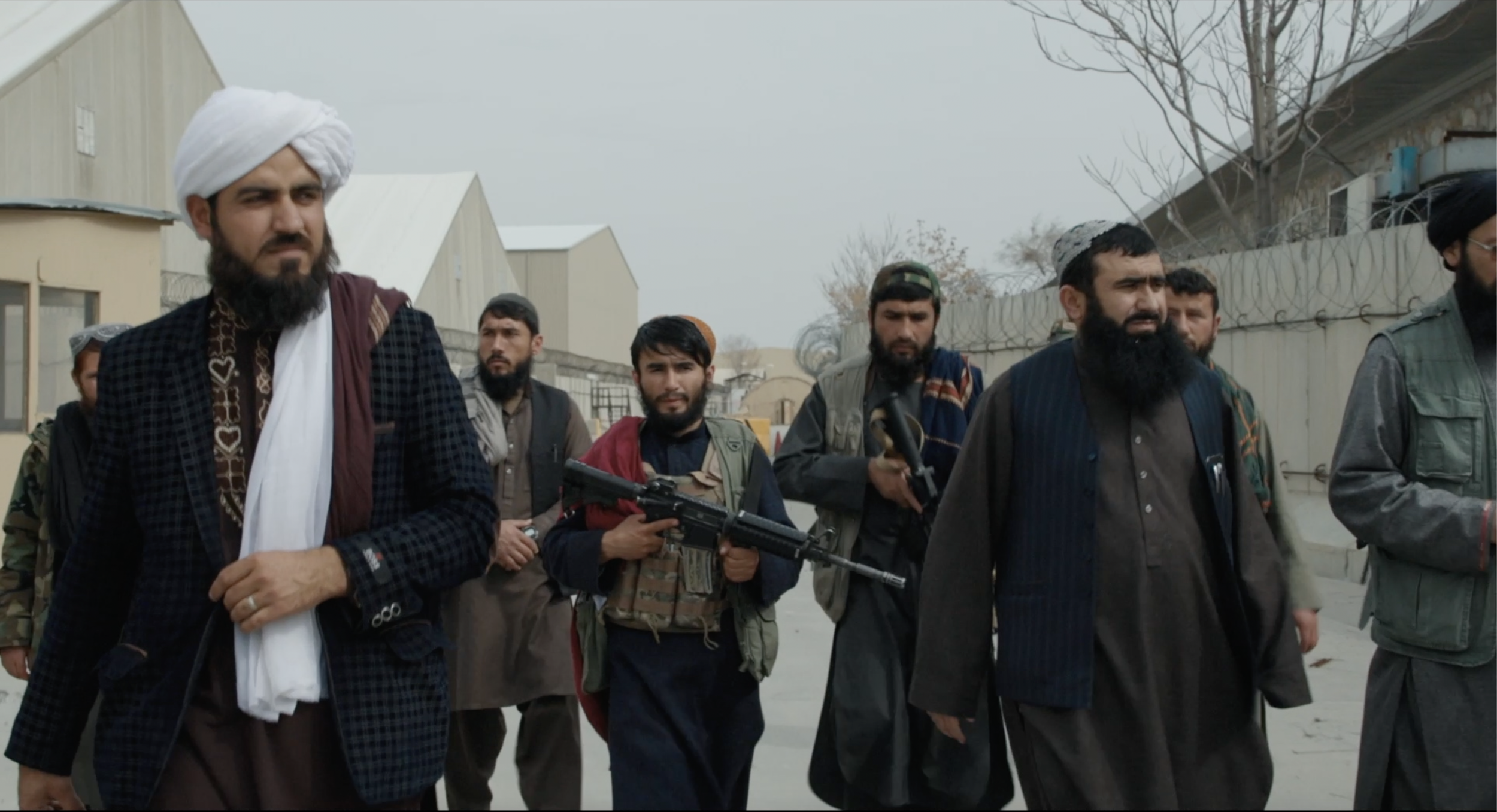Hollywoodgate Directed by Ibrahim Nash'at
Hollywoodgate
Directed by Ibrahim Nash'at
Country: USA, Germany
Year 2023
Review author: Roberto Matteucci
Click Here for Italian Version
“Americans left us an enormous treasure.”
How many wars has the United States of America fought, provoked, or unleashed?
How many coups d'état have organised? How many enemies have died, been injured and tortured?
According to a 2015 article on the site informare.over-blog.it (1):
“The United States has been at war 222 years out of 239 that they have existed as a state”,
from 1776 to the date of publication, the years of peace have been only twenty-three. From The American Revolution (1775 –1783) to the War in Afghanistan from 2011 to 2015. Again, the war in Iraq. The civil war in Ukraine and that in Syria.
On the site libraries.indiana.edu (2), Indiana University Bloomington counts forty-eight wars up to 2003.
Wikipedia states one hundred and ten but the update is in real time. (3)
These are the direct warfare, then, there are those inspired by the USA but engaged by other nations like the current war between Ukraine and Russia. And all the deceitful underground manoeuvres to instigate hostilities, coups, attacks, kidnappings, terrorism. The most famous is the CIA intervention in Pinochet's coup in Chile and the subsequent bloody repression.
The wars have been countless, making an exact count impossible. Guessing the number of American wars is like guessing how many beans are in a jar.
In these countless wars, how many victims have there been? Considering only the most sensational massacres:
in the Korean War, about three million (4), in the Vietnam War, estimates depend on the sources, but there are many millions; three million and one hundred thousand are in North Vietnam:
“… according to a newly publicized survey by the Government, took the lives of 1.1 million Communist soldiers and two million Vietnamese civilians. (The Government says it has no way of estimating the number of dead from the former South Vietnamese Army.)”(5)
or five million:
“Cinq millions de morts: 20 ans apregraves la fin de la guerre du Vietnam, le gouvernement de Hanoi a reacute veacute leacute, lundi, le bilan d'un conflit dent le nombre de victimes avait eacute teacute minore a l'eacutepoque pour ne pas affecter le moral de la population.” (6)
Then we should add the deaths in Cambodia and Laos.
In Iraq (2003), there are two hundred thousand:
“Approximately 200,000: The number of Iraqi civilians killed in the war.” (7)
According to the Italian daily newspaper Il Manifesto, the total ranges from twenty to thirty million deaths. (8)
How many wars have the United States won since the Second World War?
Clint Eastwood in Gunny: one. The USA Army won the war against the great Grenada with its one hundred and ten thousand inhabitants.
Was it always the fault of these evil nations? Was Vietnam, Korea, Iraq that violated and assaulted meek America?
The answer from filmmaker Ibrahim Nash'at, in his documentary Hollywoodgate, is certain: it was the ruthless Afghans who attacked the United States. The American soldiers had only defended their homeland by building the first defensive line 11,925 kilometres from home.
Hollywoodgate was presented at the 80th Venice Film Festival.
Afghanistan has perpetually been a country with many difficulties and numerous wars. In 1979, the Soviet invasion lasted for ten years. In 1996, President George W. Bush ordered the occupation. A terrible, cruel war, with two different strategies. With deadly and very expensive weapons from the Americans. With guerrilla warfare and rifles from the Taliban. On August 30, 2021, The Marines fled Kabul in a panic, recalling the same defeat as Saigon in 1975. Once the Americans left, the Afghan army, trained and armed for years by NATO, should have faced the Taliban. Yet, in a single day, the troops dissolved. The soldiers ran away, the weapons were abandoned, piled up in unused forts.
The documentary narrates the story of these weapons: sophisticated, lethal remained intact and ready to be used.
Kabul. A market, potholes, poppies, some women are beaten in the street by the Taliban. This is grainy, apparently amateurish footage. This incipit superficially reports the multitude of clichés belonging to the sample of images of the Afghans. Poverty, destruction, drugs, machismo.
Following these sequences are clear shots of Ibrahim Nash'at, who manages to get accepted by the Taliban to film them for a documentary. How he did manage it:
“… until it led me to Malawi Mansour, who had just been appointed as the Head of the Air Forces. He directly accepted my request to film Mukhtar, so I asked to film with him too and he agreed.”(9)
...
“Though I thought that my background was what would ensure my access, their exaggerated interest in the work I did filming world leaders made me realize that what they saw in me was someone who could feed their internal image of themselves as people of power.”(9)
Did he lie? Did he deceive them? Was he given preferential treatment? And by whom? Why was Ibrahim Nash'at chosen among so many interested reporters? Did he play on their vanity to be the protagonists of a film?
The film does not put them in a good light. Ibrahim Nash'at does not seem to be afraid of their reputation for bloodthirsty, he continually appears calm and peaceful.
The director follows Afghan General Malawi Mansour, head of the Afghan Air Force, an air force that, probably, never possessed a proper fleet of warplanes."
Malawi Mansour fought in the war. His father was killed by the Americans.
The film starts with an inspection of a former American air base called Hollywoodgate. A Freudian slip? Not really. The war in Afghanistan was a war for cinema, the producers. Or rather, served the dominant arms industries and the warmongering politics of the newcom?
The Taliban look around, observing these war machines, never seen before. They wonder how to use them, whether they need to practise. They have these weapons but they do not have the know-how to shoot, they do not have the instructions but perhaps in the world they will find someone capable of helping them.
The Taliban talk about money like normal administrators, but they do not seem to be talented at mathematics, but arithmetic is not essential for flying a plane.
Malawi Mansour talks about the desire to penetrate Tajikistan but the general confesses that they cannot because they are friends of the Russians. The Russians also emerge with the arrival of one of their diplomats to attend a prestigious military parade.
Then, there are the slaps to some soldiers who want to participate in a party without having an invitation.
The film proceeds with many short, cut-out sequences, shown in a succession of rhythms.
The Taliban are proud, anxious for the challenges ahead. They are powerful, gratified by the victory and optimistic.
They are certainly not corrupt, weak, or suspicious; otherwise, the director would never have made this film.
Some symbols can be read clearly. Besides the weapons, what did the Americans leave inside the military base? Alcohol, ruins, dirt, confusion, depression. The classic reality after an escape.
The pride of the Taliban is represented by their security, if they have had their American technology, they would have dominated the world. Rational reflection is hard to understand for a decadent West doomed to moral decline and an unpleasant future.
They are even experts in American psychology: Afghans grasp America's fear of humiliation by China.
They know journalists correctly: “I don't like journalists”. For the Taliban, they are all spies at the service of foreign intelligence.
They are also big children, like when they run surprised on the tapis roulant.
More disturbing is the parade of suicide bombers with the other troops.
Ibrahim Nash'at is a heterodiegetic narrator with a political view of the events. He perceives the suffering but not the causes. There is no depth of thought. There is no historical or scientific analysis, not even a banal alternation of opinions or a debate. He simply films, knowing that once finished, he can return to his safe house in the West.
There is no expectation, interweaving or even plot. There is no tension or development. There is no atmosphere. There is no discussion between good and evil, since the director has a pre-established filmic idea, he attributes all the blame to the Taliban. The Afghans are poor, surrounded by rubble, dead, amputees, who are at fault? Obviously, the Taliban was in government for just a year and they found a destroyed state. While the twenty years of a pro-American government, which maintained power with the army, ignoring the will of the Afghan people, were resembling a Renaissance.
Ibrahim Nash'at accomplished his theme without infamy and without praise because he is lazy, a slacker. He films with a snobbery similar to an English colonialist busy sipping tea in the shade while he watches his workers picking cotton under the scorching sun. The film is a missed opportunity, politically correct, reactionary and soporific. A bit of cunning would have been enough to be on the right path.
Gianfrasket, “Gli Stati Uniti sono stati in guerra 222 anni su 239 che esistono come stato”, 26 febbraio 2015, http://informare.over-blog.it/2015/02/gli-stati-uniti-sono-stati-in-guerra-222-anni-su-239-che-esistono-come-stato.html Translated by authour
https://libraries.indiana.edu/political-history-americas-wars
https://en.wikipedia.org/wiki/List_of_wars_involving_the_United_States
https://english.news.cn/20220902/735703a45cfd458791179d4c0a80e727/c.html
https://www.nbcnews.com/meet-the-press/meetthepressblog/iraq-war-numbers-rcna75762
https://ilmanifesto.it/dal-1945-ad-oggi-20-30-milioni-gli-uccisi-dagli-usa Translated by authour
Pressbook












In 1942, Japan conquered the Philippines from the Americans. In 1945, they would be kicked out. Due to the geography of the Philippines, many Japanese remained isolated and stuck in the jungle. The order was to join the last military resistance in Cebu. The retreat was a massacre. The Japanese were already undernourished, without rations for a long time.
This episode is filmed by Shinya Tsukamoto in the film Nobi - Fires On the Plain presented at 71 Venice Film Festival.